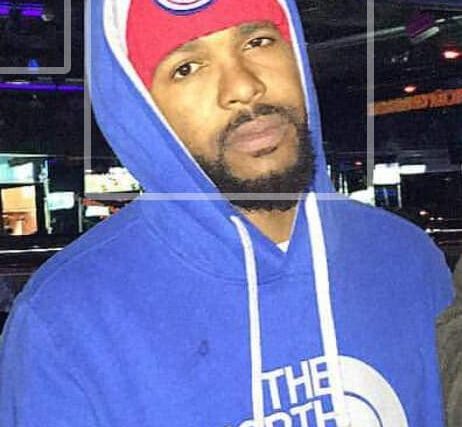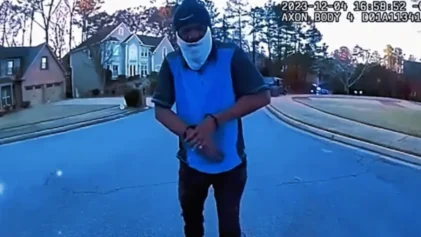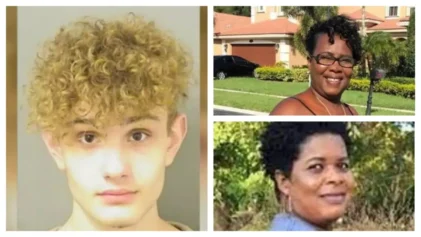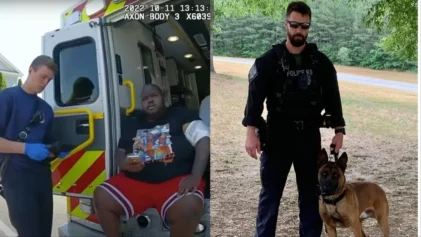A Black man was shot and killed by an undercover police detective in Newark, New Jersey, on Jan. 1, and local activists are pushing for the officer to face charges.
Carl Dorsey III, a 39-year-old South Orange man, was shot by Rod Simpkins, a plainclothes Newark Police Department detective just minutes after the New Year’s ball dropped.
The New Jersey Attorney General’s Office is investigating the shooting as required by a 2019 state law that necessitates the independent review for all deadly officer-involved encounters. But the state agency has yet to reveal several details about the shooting, citing its ongoing investigation.

According to preliminary reports from the AG’s Office, the fateful incident occurred at 12:03 a.m. on Jan. 1 near the intersection of 11th Street and Woodland Avenue. Patrol officers responded to the area and Simpkins shot Dorsey with his 9mm service weapon. Dorsey was rushed to University Hospital in Newark to be treated, but he died there at 1:37 a.m.
In a statement the following day, Newark Mayor Ras Baraka indicated shots were being fired when officers arrived to the scene. The mayor said Simpkins fired a single round and authorities recovered two firearms. His statement also indicated at least one arrest was made. Simpkins, an 18-year veteran of the department, has been placed on administrative leave pending the outcome of the investigation.
The AG’s findings must be presented to a grand jury, as dictated by the 2019 state directive.
Local activists say eyewitness accounts differed from the narrative authorities are giving. They claim Dorsey was unarmed and contend no weapon was recovered near him. Several grassroots groups have staged protests, demanding that Simpkins be indicted for murder. They’re also calling on Baraka to issue an executive order to equip all of the city’s undercover police officers with body cameras.
“A lot of these plainclothes detectives, or so-called undercover officers, are not required to wear bodycams. So a lot of the Gestapo tactics that they once used, they’re still practicing,” said Sharif Amenhotep, leader of Newark New Black Panther Party chapter in Newark. “They’re still doing stop-and-frisk, they’re still planting guns and drugs on people. And as we can see, they’re still shooting and killing people.”
The fatal incident unfolded as New Year’s Eve celebrations were in full swing. According to court documents obtained by NJ Advance Media, officers patrolling the area heard gunshots. They responded to the intersection of 11th Street and Woodlawn Avenue, where they saw several people gathered in the street and “numerous muzzle flashes.” The crowd fled when officers arrived to the scene, according to the charging affidavit of a 39-year-old Irvington, New Jersey, man who was arrested during the ensuing police chase. The arrest report did not include details specifically about Dorsey’s shooting, but shed light on what led up to it.
The suspect was charged with weapons offenses and resisting arrest as part of what some officials have described as a shootout. A detective nabbed the man and recovered a 9mm pistol that he tossed during a foot chase, according to the arrest affidavit. Officers also found several 9mm shell casings at the intersection.
It was not clear where the second gun was found. The Attorney General’s Office declined to confirm details of the mayor’s statement, citing the ongoing investigation.
Activists noted that the arrest was made about a block away from Dorsey’s run-in with Simpkins and came nearly 15 minutes after he’d been shot. They said it was unconnected.
Zayid Muhammad, a principal organizer for the Newark Communities for Accountable Policing, disputed claims that their was a shootout between rival gangs that led up to Dorsey’s death.
“This killing takes place in the context of Newark being in the throes of a major police reform effort,” he said.
There’s no body camera footage available. According to officials, Newark’s plainclothes detectives aren’t outfitted with the body-worn devices and their unmarked vehicles aren’t equipped with dash cameras. A security camera at a nearby home did, however, capture the shooting, activists confirmed. Amenhotep provided Atlanta Black Star with the surveillance footage, which was leaked on Facebook.
The 69-second recording shows two plainclothes officers pull up to the scene in a minivan. Dorsey darted into the frame as Simpkins jumped out of the vehicle’s passenger side with his gun drawn. The two seem to run toward each other and Simpkins appeared to try to grab Dorsey. They collided as they crossed paths and ran past each other. Simpkins turned toward Dorsey, and Dorsey stumbled backward as he spun around to face the officer. Simpkins then fired a shot, sending Dorsey sprawling onto the hood of a vehicle parked behind him.
The plainclothes officer opened fire within five seconds of exiting the unmarked police vehicle.
Peter Aseltine, a spokesman for the Attorney General’s Office, couldn’t specify whether surveillance footage was being used as evidence. But he confirmed that investigators are aware of “non-police footage,” which will be released after the initial phase of the investigation is substantially complete. That typically takes about 20 days, he told Atlanta Black Star in an email Tuesday.
Amenhotep said the plainclothes detectives are part of a police unit known on the streets of Newark simply as “the train,” a nickname derived for how they drove through neighborhoods in convoys of unmarked vehicles. He contends Dorsey was trying to flee the scene when Simpkins jumped out on him, noting the shooting happened in a high-crime area.
“So anytime someone pulls up in these unmarked, tinted-window cars and jumps out with guns, naturally you’re going to have a response. Naturally, you’re going to want to run,” he said. “They weren’t in marked cars, nobody knew that they were police.”
Simpkins was one of four plainclothes officers named in a 2009 lawsuit filed by a Pop Warner football coach and the parents of two players from his team, NJ.com reported. The suit claimed the officers pulled the coach over while he was driving with the two boys, ages 13 and 15, and approached the car with guns drawn in June 2008. The officers pulled the trio out of the car and told them “you have no f—–g rights…we’re cops, we do whatever the f–k we want,” the complaint alleged.
The U.S. Department of Justice opened an investigation into allegations of civil rights abuses by Newark Police Department in 2011 after the American Civil Liberties Union petitioned for a federal probe. In a July 2014 report, DOJ documented a pattern of abuse, corruption and discrimination in the department. The investigation, among other things, revealed a culture of excessive force with no justification, retaliation by officers who felt challenged, and a pattern of theft rampant in NPD’s gang and narcotics units. There was a lack of probable cause in 75 percent of the department’s pedestrian stops. The department also detained and arrested Black residents disproportionately more than their white counterparts.
Newark entered into a consent decree — a written settlement agreement — with the Justice Department in 2016 to reform the city’s police force. It was a mandate for sweeping policy changes that included the establishment of a civilian review board, broader de-escalation training and revisions to use-of-force and internal investigation procedures. Federal officials monitored the city’s progress and the changes seemed to be working. Newark had no officer-involved shootings in 2020. The New Year’s Day incident marked the first time an officer shot and killed a civilian since January 2019, NJ.com reported.
Many of the progressive policy changes have come under Baraka. The Newark native took the helm as mayor in midsummer 2014. Activist groups credited his administration with working with grassroots organizations to implement effective strategies such as community listening sessions, an academy for students who’ve dropped out, and reallocating $12 million from the police department to create an Office of Violence Prevention.
Baraka himself started one of the grassroots groups, the Newark AntiViolence Coalition, when he was a city councilman.


